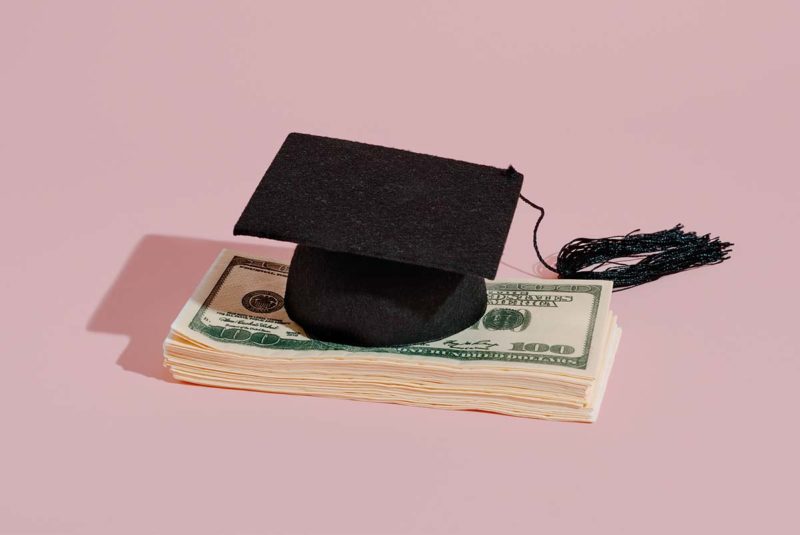So you’re ready to continue your climb up the education ladder. Maybe you’re looking at a 4-year college or university or a training program. No matter what type of school or program you pick, getting an education costs money. To help cover the costs of your education, you’ll probably need to take out student loans.
You may not have anyone to co-sign your loan(s). And that might be the case for a variety of reasons, including:
- You lost your parent(s), are no longer living with your parent(s) or your parent(s) can’t or won’t give you money for school.
- You’re legally emancipated from your parents or are in foster care.
- You will be attending school as an adult, and your parent(s) no longer claim you as a dependent.
If you fall into any of these categories, there are loan options available that don’t require a co-signer.
Can You Get Student Loans Without a Co-Signer?
If you’re a college student or soon-to-be college student, you probably don’t have an extensive credit history or work history. That’s not only normal, but it’s okay. You’re probably going to school to develop the skills you’ll need to work in a career that builds your credit and work history.
Not having a credit history or work history is usually why student loan providers prefer that you have your loans co-signed by someone with an established credit and job history, like a parent, relative or close friend. That way, if you can’t make your monthly payments, your co-signer will. In fact, they’re legally responsible to repay the loan if you can’t.
The good news? You can get a federal student loan or a private student loan without a co-signer.
Federal Student Loans Without a Co-Signer
If you need a student loan and don’t have a co-signer, your first stop should be StudentAid.gov. Federal student aid is managed by the Department of Education. And here are some helpful things to know about federal student loans:
- They are fixed-rate low-interest loans that start at 4.99% interest.[1]
- There are different types of federal student loans, including Direct subsidized, Direct unsubsidized and Direct PLUS loans.
- There’s a 6-month grace period after you graduate or leave school, giving you time to find a job before you start making payments.
- If you have trouble repaying your federal student loans, there are income-based repayment programs, deferment and forbearance options and loan forgiveness programs available.
If you want to get a student loan without a co-signer, federal student loans can be a great starting option.
- Undergraduate students: Undergrads can borrow between $5,500 – $12,500 a year with Direct subsidized loans and Direct unsubsidized loans. The amount you get will be based on the number of years you’ve been in school and whether you’ve been claimed as a dependent by your parents.
- Graduate or professional students: Grad or professional students can borrow up to $20,500 each year in Direct unsubsidized loans and Direct PLUS loans.
Applying for Federal Student Loans Without a Co-Signer
To qualify for federal student loans, you’ll need to fill out the Free Application for Federal Student Aid (FAFSA®) form.
While the FAFSA® requests that you submit your parent’s information, you can waive this requirement if you are[[citation source=2]:
- 24 or older
- Currently pursuing a master’s or doctoral degree
- Married (or have been married)
- Currently on active duty in the U.S. armed forces for purposes other than training
- A veteran of the U.S. armed forces
- Have (or are expecting to have) children you help support
- Formerly a dependent or ward of the court at any time since you were 13, were in foster care, or your parent(s) are deceased
- A legally emancipated minor or someone other than your parent(s) or stepparent(s) has legal guardianship of you
- Determined to be an unaccompanied youth who was homeless or self-supporting and at risk of being homeless at any time in the past year
You’ll also include the names of the schools you want to attend on the form. If a school accepts you, they can incorporate your FAFSA® information into your award letter, letting you know what kind of financial aid you’re eligible to receive.
Private Student Loans Without a Co-Signer
You may also need to look at private student loans. Private student loans are usually offered through banks, credit unions and online lenders.
The good news is you can get a private student loan without a co-signer, but it may be harder to qualify.
There are loan providers that specialize in offering loans to students without co-signers, and you can research them online.
When you’re comparing loan offers, keep the following in mind:
How much interest does the lender charge?
Interest is the amount a lender charges you to borrow money. The higher the interest rate, the more a loan will cost over time. Lenders usually determine the interest rate based on your creditworthiness, so you may pay a higher interest rate if you don’t have a co-signer.
Is the interest rate fixed or variable?
Federal student loans are fixed-rate loans, which means your interest and monthly payments stay the same over the life of the loan.
Some private loans are fixed, and some are variable. A variable loan comes with a low introductory rate that can fluctuate over time. You may start with a low initial rate, but if interest rates go up after the introductory period, you could find yourself paying more than you anticipated for the loan in the long run.
What are the minimum and maximum loan amounts available?
Lenders may put limits on the amount you’re allowed to borrow. How much you can borrow can vary, depending on your creditworthiness and your anticipated income. If you have a clear sense of how much you’ll need to borrow, that can help you decide what loan amount is right for you.
What loan terms are available?
A loan term is the length of time you have to repay a loan. Different loans have different loan terms. The repayment period for most loans is 10 – 20 years. A longer repayment period means lower monthly payments, but you pay more in interest over the life of the loan.
How soon do you need to start repaying your loans?
With some private student loans, you start repaying after you graduate or if your enrollment status changes. Some loans require payment as soon as the money is disbursed to your school.
Do you meet the requirements for the student loan?
Private lenders have specific requirements to qualify for a loan. Some lenders offer international student loan options for international students while others may not offer loans in specific states. Check the lender’s criteria carefully before you apply.
What are the fees and discounts?
See how much the lender charges in application fees and what kinds of fees or penalties you may be charged if you make any late payments. (FYI: Some lenders will offer cash back rewards or a discount on your loan if you maintain a certain GPA.)
How To Qualify for Private Student Loans Without a Co-Signer
To qualify for private student loans without a co-signer, you’ll need a credit score. Your credit score is a three-digit number that ranges from 300 – 850 and measures your creditworthiness. The higher the number, the better your credit score.
While every loan and lender is different, the line that separates a good credit score from a bad credit score usually falls around the 620 – 640 mark.
To qualify for private student loans without a co-signer, you’ll typically need a credit score in the mid-600s, though some lenders may accept a lower score.
Building a credit score takes work, but it isn’t impossible.
To get started or improve your existing credit score, take the following steps:
Pay your bills
Credit agencies record your payment history – every on-time and late payment. If you pay your own bills, pay them on time every time. Even something as simple as making utility payments on an apartment or paying your own bill for your cellphone or – in some cases – a streaming service subscription can help you establish a strong credit history.
Take out a credit card
Credit cards should be used with care. But having one or two in your wallet can help you establish a credit history. Research credit card options online or talk to your local bank or credit union. The trick to building your credit with credit cards is to pay your balances off every month.
You may be able to get a credit card through a store or your cellphone provider. Just be careful with store brand cards. The interest on them is usually higher than traditional credit cards, so you’ll want to pay off your entire balance every month.
Use a secured credit card
Consider applying for a secured credit card. With secured cards, you deposit a sum of money you can borrow against with a lender. When you pay your balance, your limit goes back up, and you can continue to use the card. These cards are usually available online or through banks or credit unions.
Put money in the bank
While having a savings or checking account won’t directly impact your credit score, setting up a checking or savings account and making regular deposits may help you demonstrate to private lendesr that you have money coming in.
If you work, even part-time, see if your employer can direct deposit your paychecks. If you have family members helping you out, see if they can transfer or deposit money into your bank account.
Most local banks have student savings and checking accounts, and most colleges and schools offer on-campus banking programs designed for student budgets.
How To Apply For Student Loans Without a Co-signer
To review, here are the steps to apply for student loans without a co-signer:
- Federal student loans: Fill out the FAFSA® form. Because federal student loans come with a wide range of debt relief options, the more that you can take advantage of federal student loans, the better.
- Private student loans: Check your credit score and look for ways to improve it if it needs work. To check your credit history you can request a free copy of your credit reports at AnnualCreditReport.com. Research private lenders to see which loans you may qualify for. Make sure to compare loan terms to find the right offer for you.
What To Do if You Can’t Get Approved Without a Co-Signer
If you can’t get approved for student loans without a co-signer, you’ve still got options.
- Talk to your family and friends: Make the ask. Extended family or friends may be able to offer financial assistance.
- Talk to your school: Talk to your school’s financial aid office for help identifying scholarships, grants and other “free money” options you can apply for.
- Enroll in a more affordable school: If you can’t afford a pricey university, get a head start at your local community college. Many universities also offer part-time or continuing education classes you can take while you’re working.
- Talk to your boss: Some employers offer tuition assistance programs or scholarships for qualified employees. Your parents’ employers or unions may offer the same benefit.
- Consider other loan options: If you or a family member owns a home and has good credit, you may be able to finance your education by taking out a home equity loan or a home equity line of credit (HELOC). For both of these loans, the home is the collateral that secures the loan. If you miss payments, you or your family member may lose their home. You could also take out a personal loan, but personal loans usually have higher interest rates.
- Take a gap year: It may make sense to wait a year before applying for student loans. You can use the time to build your credit history, improve your credit score, grow your savings and look for potential co-signers. It may take some work, but it could save you money in the long run.
You’ve Got This
Higher education, here you come! If you don’t have a co-signer for your student loans, don’t worry. You’ve got this – and you’ve got options to help you to get the financial assistance you’ll need.
The Short Version
- You can get a federal student loan or a private student loan without a co-signer
- To qualify for private student loans without a co-signer, you’ll typically need a credit score in the mid-600s, though some lenders may accept a lower score
- You can get a private student loan without a co-signer, but it may be harder to qualify
Federal Student Aid Information Center. “Federal Student Loan Programs.” Retrieved February 2022 from https://studentaid.gov/sites/default/files/federal-loan-programs.pdf
Federal Student Aid Information Center. “When I Fill Out the FAFSA Form…Am I a Dependent or Independent?” Retrieved February 2022 from https://studentaid.gov/sites/default/files/fafsa-dependency.pdf




